8 june 2018
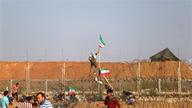
Millions of people across Iran and other world countries have rallied on the International Quds Day to show their solidarity with the Palestinians and condemn Israel’s decades-long occupation and atrocities.
In Tehran and other cities and towns, people from all walks of life took to the streets for the annual event which falls on the last Friday of the Muslim fasting month of Ramadan.
They chanted "Death to Israel" and "Death to America", burning the Israeli flag.
Parliament Speaker Ali Larijani addressed worshipers at Friday prayers in Tehran, during which he said the Israeli regime had realized its "shaky security" ground which has emerged as a result of "the resistance and awakening of the Palestinian people".
"Israel and Saudi Arabia are the source of chaos in the region. The Saudi Arabia, Israel and American triangle wants to turn the region into a chaotic scene," he said.
"Israel is failing ... the claim of creating a new regional order is a mistake they are making and it is an illusion ... It is our responsibility to defend Palestinians," Larijani added.
In a communiqué issued at the end of the rallies in the Iranian capital, the demonstrators renewed their call for the liberation of Palestine from the Israeli occupation as a cause of Iran’s 1979 Islamic Revolution.
They also strongly denounced US President Donald Trump's decision to move the US embassy from Tel Aviv to Jerusalem al-Quds, saying the liberation of the holy city remains the "top priority of the Muslim world".
The participants further pledged support for the “path of resistance and intifada”, stressing the need for strong unity among different Palestinian factions to speed up anti-Israel struggles.
The communiqué said the only solution to the Palestinian issue is facilitating the return of displaced Palestinians to their homeland and holding free elections for the nation to decide its destiny.
The demonstrators also condemned the Tel Avive regime's attempts "to Judaize the occupied territories and destroy Palestine’s national and historical identity," calling on international and regional institutions to help foil Israel's "dangerous plot by taking firm and practical measures.”
Similar events are planned in London and Toronto as well as in 800 cities worldwide, which usually see people chanting anti-Israeli slogans and burning the occupying regime's flags.
Organizers in Toronto said the theme of the rally is to push for “justice, peace and love” and countering Islamophobia and racism as well as opposing the “Zionism and Israeli war crimes”.
Near the Israeli fence separating Gaza from the occupied territories, Palestinians are expected to throng the site which has become the scene of bloodshed in recent weeks.
Israel's Channel 2 News said the protesters planned to wear clothing made to resemble uniforms worn by prisoners in concentration camps in the Holocaust.
On Thursday, the Israel air force completed a mass exercise simulating a war on Gaza.
The International Quds Day is a legacy of the late founder of the Islamic Republic Imam Khomeini, who designated the day in solidarity with the Palestinians.
This year, Quds Day has become a larger rallying cry as it comes after months of mass protests in Gaza which proved Israel's inability to stop the Palestinians despite widespread use of deadly force against unarmed protesters.
Since late March, over 120 Palestinian protesters have been killed and thousands more wounded by Israeli forces, mainly sharpshooters. The Israeli military has come under intense international criticism for permitting its forces to open fire on unarmed protesters in Gaza.
Tensions have been running high near the Gaza fence since March 30, which marked the start of a series of protests, dubbed “The Great March of Return,” demanding the right to return for those driven out of their homeland.
The Gaza clashes reached their peak on May 14, the eve of the 70th anniversary of the Nakba Day (the Day of Catastrophe), which coincided this year with the US embassy relocation from Tel Aviv to occupied Jerusalem al-Quds.
In Tehran and other cities and towns, people from all walks of life took to the streets for the annual event which falls on the last Friday of the Muslim fasting month of Ramadan.
They chanted "Death to Israel" and "Death to America", burning the Israeli flag.
Parliament Speaker Ali Larijani addressed worshipers at Friday prayers in Tehran, during which he said the Israeli regime had realized its "shaky security" ground which has emerged as a result of "the resistance and awakening of the Palestinian people".
"Israel and Saudi Arabia are the source of chaos in the region. The Saudi Arabia, Israel and American triangle wants to turn the region into a chaotic scene," he said.
"Israel is failing ... the claim of creating a new regional order is a mistake they are making and it is an illusion ... It is our responsibility to defend Palestinians," Larijani added.
In a communiqué issued at the end of the rallies in the Iranian capital, the demonstrators renewed their call for the liberation of Palestine from the Israeli occupation as a cause of Iran’s 1979 Islamic Revolution.
They also strongly denounced US President Donald Trump's decision to move the US embassy from Tel Aviv to Jerusalem al-Quds, saying the liberation of the holy city remains the "top priority of the Muslim world".
The participants further pledged support for the “path of resistance and intifada”, stressing the need for strong unity among different Palestinian factions to speed up anti-Israel struggles.
The communiqué said the only solution to the Palestinian issue is facilitating the return of displaced Palestinians to their homeland and holding free elections for the nation to decide its destiny.
The demonstrators also condemned the Tel Avive regime's attempts "to Judaize the occupied territories and destroy Palestine’s national and historical identity," calling on international and regional institutions to help foil Israel's "dangerous plot by taking firm and practical measures.”
Similar events are planned in London and Toronto as well as in 800 cities worldwide, which usually see people chanting anti-Israeli slogans and burning the occupying regime's flags.
Organizers in Toronto said the theme of the rally is to push for “justice, peace and love” and countering Islamophobia and racism as well as opposing the “Zionism and Israeli war crimes”.
Near the Israeli fence separating Gaza from the occupied territories, Palestinians are expected to throng the site which has become the scene of bloodshed in recent weeks.
Israel's Channel 2 News said the protesters planned to wear clothing made to resemble uniforms worn by prisoners in concentration camps in the Holocaust.
On Thursday, the Israel air force completed a mass exercise simulating a war on Gaza.
The International Quds Day is a legacy of the late founder of the Islamic Republic Imam Khomeini, who designated the day in solidarity with the Palestinians.
This year, Quds Day has become a larger rallying cry as it comes after months of mass protests in Gaza which proved Israel's inability to stop the Palestinians despite widespread use of deadly force against unarmed protesters.
Since late March, over 120 Palestinian protesters have been killed and thousands more wounded by Israeli forces, mainly sharpshooters. The Israeli military has come under intense international criticism for permitting its forces to open fire on unarmed protesters in Gaza.
Tensions have been running high near the Gaza fence since March 30, which marked the start of a series of protests, dubbed “The Great March of Return,” demanding the right to return for those driven out of their homeland.
The Gaza clashes reached their peak on May 14, the eve of the 70th anniversary of the Nakba Day (the Day of Catastrophe), which coincided this year with the US embassy relocation from Tel Aviv to occupied Jerusalem al-Quds.
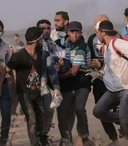
An Israeli army drone dropped, early on Friday morning, firebombs at protest tents, in one of the Great Return protest camps in Rafah, in the southern part of the Gaza Strip.
The firebombs caused fire to the tents, and burnt dozens of tires around them which were prepared to be used during the upcoming protest, on Friday afternoon.
The Israeli fire bombs caused fire in several other tents, in the same area; the attack led to property damage, but no injuries.
The Higher Committee for the Great Return March, said the Israeli attacks yet another indication that the Israeli army is desperate due to its failure on stopping the processions despite the use of sniper fire against the unarmed protesters, and the large casualties among the Palestinians.
It added that the Palestinians are demanding their legitimate, internationally guaranteed rights of liberation, independence and the Right of Return of the refugees.
It is worth mentioning that the army has killed 123 Palestinians, including 13 children, in the Gaza Strip, and injured more than 13672 others, including hundreds who suffered serious wounds, mainly after being shot with expanding bullets, since March 30th.
Among the slain Palestinians is a medic, identified as Razan Ashraf Najjar, 22, who was fatally shot after the soldiers targeted her and four other medics providing treatment to wounded Palestinians, in a field hospital in Rafah, in the southern part of the coastal region.
The soldiers also injured 223 medics, including 29 who were shot with live fire or after being targeted by high-velocity gas bombs.
Among the casualties are two journalists, identified as Yasser Mortaja, 31, and Ahmad Abu Hussein, 25, who were killed by Israeli army fire, and 144 others were injured.
The firebombs caused fire to the tents, and burnt dozens of tires around them which were prepared to be used during the upcoming protest, on Friday afternoon.
The Israeli fire bombs caused fire in several other tents, in the same area; the attack led to property damage, but no injuries.
The Higher Committee for the Great Return March, said the Israeli attacks yet another indication that the Israeli army is desperate due to its failure on stopping the processions despite the use of sniper fire against the unarmed protesters, and the large casualties among the Palestinians.
It added that the Palestinians are demanding their legitimate, internationally guaranteed rights of liberation, independence and the Right of Return of the refugees.
It is worth mentioning that the army has killed 123 Palestinians, including 13 children, in the Gaza Strip, and injured more than 13672 others, including hundreds who suffered serious wounds, mainly after being shot with expanding bullets, since March 30th.
Among the slain Palestinians is a medic, identified as Razan Ashraf Najjar, 22, who was fatally shot after the soldiers targeted her and four other medics providing treatment to wounded Palestinians, in a field hospital in Rafah, in the southern part of the coastal region.
The soldiers also injured 223 medics, including 29 who were shot with live fire or after being targeted by high-velocity gas bombs.
Among the casualties are two journalists, identified as Yasser Mortaja, 31, and Ahmad Abu Hussein, 25, who were killed by Israeli army fire, and 144 others were injured.
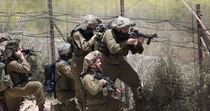
The Israeli Occupation Forces (IOF) decided to increase its alert for tomorrow's angry protests along Gaza borders.
Israeli forces operating along the Gaza border will be doubled and police forces in the area will be reinforced, Israeli media sources revealed.
Israeli forces will also increase the level of alert in West Bank in anticipation of the expected protests.
Tens of thousands of Palestinians are scheduled to participate in large protests along Gaza borders commemorating Naksa day (setback).
Israeli forces operating along the Gaza border will be doubled and police forces in the area will be reinforced, Israeli media sources revealed.
Israeli forces will also increase the level of alert in West Bank in anticipation of the expected protests.
Tens of thousands of Palestinians are scheduled to participate in large protests along Gaza borders commemorating Naksa day (setback).
7 june 2018
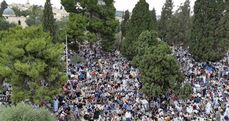
The Islamic Jihad Movement in the occupied West Bank has called on the Palestinian masses to intensify presence at holy al-Aqsa Mosque and Occupied Jerusalem on Friday.
Islamic Jihad leader Ahmed al-Ouri launched calls for a large-scale participation in Friday’s events, set to be staged on the occasion of the Naksa.
Friday’s projected events will be an opportunity to confirm Palestinians’ commitment to their land and holy sites and to speak up against Israel’s incessant attempts to liquidate the Palestinian cause, the movement added.
Al-Ouri also stressed the need to join Friday’s protests as a means to confirm the vital role played by popular resistance throughout the anti-occupation struggle.
Islamic Jihad leader Ahmed al-Ouri launched calls for a large-scale participation in Friday’s events, set to be staged on the occasion of the Naksa.
Friday’s projected events will be an opportunity to confirm Palestinians’ commitment to their land and holy sites and to speak up against Israel’s incessant attempts to liquidate the Palestinian cause, the movement added.
Al-Ouri also stressed the need to join Friday’s protests as a means to confirm the vital role played by popular resistance throughout the anti-occupation struggle.
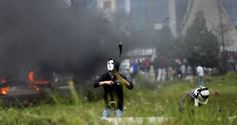
The Popular Front for the Liberation of Palestine (PFLP) has urged the Palestinian citizens in the Gaza Strip and the occupied Palestinian territories to actively participate in “Friday of Jerusalem’ rallies and activities.
In a press release, senior PFLP official Zaher Ashashtri called for necessarily marching en masse in all areas of Palestine towards Occupied Jerusalem and the Aqsa Mosque to assert the Palestinian right to the holy city and to express rejection of the recent US decisions.
Ashashtri affirmed that the PFLP would continue to support the March of Return rallies in Gaza and other areas until the liberation of Palestine, calling on all PFLP supporters to actively take part in Friday marches.
In a press release, senior PFLP official Zaher Ashashtri called for necessarily marching en masse in all areas of Palestine towards Occupied Jerusalem and the Aqsa Mosque to assert the Palestinian right to the holy city and to express rejection of the recent US decisions.
Ashashtri affirmed that the PFLP would continue to support the March of Return rallies in Gaza and other areas until the liberation of Palestine, calling on all PFLP supporters to actively take part in Friday marches.
6 june 2018

By Ramzy Baroud
June 5 2018 marks the 51st anniversary of the Israeli occupation of East Jerusalem, the West Bank and Gaza.
But, unlike the massive popular mobilisation that preceded the anniversary of the Nakba – the catastrophic destruction of Palestine in 1948 – on 15 May the anniversary of the occupation is hardly generating equal mobilisation.
The unsurprising death of the ‘peace process’ and the inevitable demise of the ‘two-state solution’ has shifted the focus from ending the occupation per se to the larger, and more encompassing, problem of Israel’s colonialism throughout Palestine.
Grassroots mobilisation in Gaza and the West Bank, and among Palestinian Bedouin communities in the Naqab Desert, are, once more, widening the Palestinian people’s sense of national aspirations. Thanks to the limited vision of the Palestinian leadership those aspirations have, for decades, been confined to Gaza and the West Bank.
In some sense the ‘Israeli occupation’ is no longer an occupation as per international standards and definitions. It is merely a phase of the Zionist colonisation of historic Palestine, a process that began over a 100 years ago, and carries on to this day.
“The law of occupation is primarily motivated by humanitarian consideration; it is solely the facts on the ground that determine its application”, states the International Committee of the Red Cross website.
It is for practical purposes that we often utilise the term ‘occupation’ with reference to Israel’s colonisation of Palestinian land, occupied after 5 June 1967. The term allows for the constant emphasis on humanitarian rules that are meant to govern Israel’s behavior as the occupying power.
However, Israel has already, and repeatedly, violated most conditions of what constitute an ‘occupation’ from an international law perspective, as articulated in the 1907 Hague Regulations (articles 42-56) and the 1949 Fourth Geneva Convention.
According to these definitions, an ‘occupation’ is a provisional phase, a temporary situation that is meant to end with the implementation of international law regarding that particular situation.
‘Military occupation’ is not the sovereignty of the occupier over the occupied; it cannot include the transfer of citizens from the territories of the occupying power to occupied land; it cannot include ethnic cleansing; destruction of properties; collective punishment and annexation.
It is often argued that Israel is an occupier that has violated the rules of occupation as stated in international law.
This would have been the case a year, two or five years after the original occupation had taken place, but not 51 years later. Since then, the occupation has turned into long-term colonisation.
An obvious proof is Israel’s annexation of occupied land, including the Syrian Golan Heights and Palestinian East Jerusalem in 1981. That decision had no regard for international law, humanitarian law or any other law.
Israeli politicians have, for years, openly debated the annexation of the West Bank, especially areas that are populated with illegal Jewish settlements, which are built contrary to international law.
Those hundreds of settlements that Israel has been building in the West Bank and East Jerusalem are not meant as temporary structures.
Dividing the West Bank into three zones, areas A, B and C, each governed according to different political diktats and military roles, has little precedent in international law.
Israel argues that, contrary to international law, it is no longer an occupying power in Gaza; however, an Israel land, maritime and aerial siege has been imposed on the Strip for over 11 years. From successive Israeli wars that have killed thousands, to a hermetic blockade that has pushed the Palestinian population to the brink of starvation, Gaza subsists in isolation.
Gaza is an ‘occupied territory’ by name only, without any of the humanitarian rules applied. In the last 10 weeks alone, over 120 unarmed protesters, journalists and medics were killed and 13,000 wounded, yet the international community and law remain inept, unable to face or challenge Israeli leaders or to overpower equally cold-hearted American vetoes.
The Palestinian Occupied Territories have, long ago, crossed the line from being occupied to being colonised. But there are reasons that we are trapped in old definitions, leading amongst them is American political hegemony over the legal and political discourses pertaining to Palestine.
One of the main political and legal achievements of the Israeli war – which was carried out with full US support – on several Arab countries in June 1967 is the redefining of the legal and political language on Palestine.
Prior to that war, the discussion was mostly dominated by such urgent issues as the ‘Right of Return’ for Palestinian refugees to go back to their homes and properties in historic Palestine.
The June war shifted the balance of power completely, and cemented America’s role as Israel’s main backer on the international stage.
Several UN Security Council resolutions were passed to delegitimise the Israeli occupation: UNSCR 242, UNSCR 338, and the less talked about but equally significant UNSCR 497.
Resolution 242 of 1967 demanded “withdrawal of Israel armed forces” from the territories it occupied in the June war. Resolution 338, which followed the war of 1973, accentuated and clarified that demand. Resolution 497 of 1981 was a response to Israel’s annexation of the Golan Heights. It rendered such a move “null and void and without international and legal affect”.
The same applied to the annexation of Jerusalem as to any colonial constructions or any Israeli attempts aimed at changing the legal status of the West Bank.
But Israel is operating with an entirely different mindset.
Considering that anywhere between 600,000 to 750,000 Israeli Jews now live in the ‘Occupied Territories’, and that the largest settlement of Modi’in Illit houses more than 64,000 Israeli Jews, one has to wonder what form of military occupation blue-print Israel is implementing, anyway?
Israel is a settler colonial project, which began when the Zionist movement aspired to build an exclusive homeland for Jews in Palestine, at the expense of the native inhabitants of that land in the late 19th century.
Nothing has changed since. Only facades, legal definitions and political discourse. The truth is that Palestinians continue to suffer the consequences of Zionist colonialism and they will continue to carry that burden until that original sin is boldly confronted and justly remedied.
- Ramzy Baroud is a journalist, author and editor of Palestine Chronicle. He has authored a number of books on the Palestinian struggle.
June 5 2018 marks the 51st anniversary of the Israeli occupation of East Jerusalem, the West Bank and Gaza.
But, unlike the massive popular mobilisation that preceded the anniversary of the Nakba – the catastrophic destruction of Palestine in 1948 – on 15 May the anniversary of the occupation is hardly generating equal mobilisation.
The unsurprising death of the ‘peace process’ and the inevitable demise of the ‘two-state solution’ has shifted the focus from ending the occupation per se to the larger, and more encompassing, problem of Israel’s colonialism throughout Palestine.
Grassroots mobilisation in Gaza and the West Bank, and among Palestinian Bedouin communities in the Naqab Desert, are, once more, widening the Palestinian people’s sense of national aspirations. Thanks to the limited vision of the Palestinian leadership those aspirations have, for decades, been confined to Gaza and the West Bank.
In some sense the ‘Israeli occupation’ is no longer an occupation as per international standards and definitions. It is merely a phase of the Zionist colonisation of historic Palestine, a process that began over a 100 years ago, and carries on to this day.
“The law of occupation is primarily motivated by humanitarian consideration; it is solely the facts on the ground that determine its application”, states the International Committee of the Red Cross website.
It is for practical purposes that we often utilise the term ‘occupation’ with reference to Israel’s colonisation of Palestinian land, occupied after 5 June 1967. The term allows for the constant emphasis on humanitarian rules that are meant to govern Israel’s behavior as the occupying power.
However, Israel has already, and repeatedly, violated most conditions of what constitute an ‘occupation’ from an international law perspective, as articulated in the 1907 Hague Regulations (articles 42-56) and the 1949 Fourth Geneva Convention.
According to these definitions, an ‘occupation’ is a provisional phase, a temporary situation that is meant to end with the implementation of international law regarding that particular situation.
‘Military occupation’ is not the sovereignty of the occupier over the occupied; it cannot include the transfer of citizens from the territories of the occupying power to occupied land; it cannot include ethnic cleansing; destruction of properties; collective punishment and annexation.
It is often argued that Israel is an occupier that has violated the rules of occupation as stated in international law.
This would have been the case a year, two or five years after the original occupation had taken place, but not 51 years later. Since then, the occupation has turned into long-term colonisation.
An obvious proof is Israel’s annexation of occupied land, including the Syrian Golan Heights and Palestinian East Jerusalem in 1981. That decision had no regard for international law, humanitarian law or any other law.
Israeli politicians have, for years, openly debated the annexation of the West Bank, especially areas that are populated with illegal Jewish settlements, which are built contrary to international law.
Those hundreds of settlements that Israel has been building in the West Bank and East Jerusalem are not meant as temporary structures.
Dividing the West Bank into three zones, areas A, B and C, each governed according to different political diktats and military roles, has little precedent in international law.
Israel argues that, contrary to international law, it is no longer an occupying power in Gaza; however, an Israel land, maritime and aerial siege has been imposed on the Strip for over 11 years. From successive Israeli wars that have killed thousands, to a hermetic blockade that has pushed the Palestinian population to the brink of starvation, Gaza subsists in isolation.
Gaza is an ‘occupied territory’ by name only, without any of the humanitarian rules applied. In the last 10 weeks alone, over 120 unarmed protesters, journalists and medics were killed and 13,000 wounded, yet the international community and law remain inept, unable to face or challenge Israeli leaders or to overpower equally cold-hearted American vetoes.
The Palestinian Occupied Territories have, long ago, crossed the line from being occupied to being colonised. But there are reasons that we are trapped in old definitions, leading amongst them is American political hegemony over the legal and political discourses pertaining to Palestine.
One of the main political and legal achievements of the Israeli war – which was carried out with full US support – on several Arab countries in June 1967 is the redefining of the legal and political language on Palestine.
Prior to that war, the discussion was mostly dominated by such urgent issues as the ‘Right of Return’ for Palestinian refugees to go back to their homes and properties in historic Palestine.
The June war shifted the balance of power completely, and cemented America’s role as Israel’s main backer on the international stage.
Several UN Security Council resolutions were passed to delegitimise the Israeli occupation: UNSCR 242, UNSCR 338, and the less talked about but equally significant UNSCR 497.
Resolution 242 of 1967 demanded “withdrawal of Israel armed forces” from the territories it occupied in the June war. Resolution 338, which followed the war of 1973, accentuated and clarified that demand. Resolution 497 of 1981 was a response to Israel’s annexation of the Golan Heights. It rendered such a move “null and void and without international and legal affect”.
The same applied to the annexation of Jerusalem as to any colonial constructions or any Israeli attempts aimed at changing the legal status of the West Bank.
But Israel is operating with an entirely different mindset.
Considering that anywhere between 600,000 to 750,000 Israeli Jews now live in the ‘Occupied Territories’, and that the largest settlement of Modi’in Illit houses more than 64,000 Israeli Jews, one has to wonder what form of military occupation blue-print Israel is implementing, anyway?
Israel is a settler colonial project, which began when the Zionist movement aspired to build an exclusive homeland for Jews in Palestine, at the expense of the native inhabitants of that land in the late 19th century.
Nothing has changed since. Only facades, legal definitions and political discourse. The truth is that Palestinians continue to suffer the consequences of Zionist colonialism and they will continue to carry that burden until that original sin is boldly confronted and justly remedied.
- Ramzy Baroud is a journalist, author and editor of Palestine Chronicle. He has authored a number of books on the Palestinian struggle.
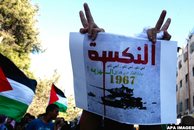
Palestinians marked, on Tuesday, June 5th, the 51st anniversary of the “Naksa,” or “setback,” when Israel invaded and occupied the West Bank, Gaza, Sinai, and the Golan Heights in 1967, during the Six-Day War, displacing some 300,000 Palestinians, as well as thousands of Syrians, from their homes.
Palestinian officials and local rights groups have called upon people in all areas affected by the occupation and illegal Israeli settlements, to organize sit-ins and protests in commemoration of the day.
Officials and rights groups called upon the international community to not only take action but demand every country to assume its legal responsibilities and stop all cooperation with the Israeli occupation, and to secure freedom and independence for the Palestinian people and protect them from the ongoing crimes and violations committed by Israel.
Furthermore, according to Ma’an News Agency, officials declared the coming Friday to be a “Day of Rage,” encouraging people to protest and, for those who are able to, travel to occupied East Jerusalem and establish a presence at the Al-Aqsa Mosque.
According to Israeli media, Israeli forces raised the level of alert on the Israeli border, along the eastern Gaza Strip, in anticipation of events of the anniversary of the Naksa.
Palestinian officials and local rights groups have called upon people in all areas affected by the occupation and illegal Israeli settlements, to organize sit-ins and protests in commemoration of the day.
Officials and rights groups called upon the international community to not only take action but demand every country to assume its legal responsibilities and stop all cooperation with the Israeli occupation, and to secure freedom and independence for the Palestinian people and protect them from the ongoing crimes and violations committed by Israel.
Furthermore, according to Ma’an News Agency, officials declared the coming Friday to be a “Day of Rage,” encouraging people to protest and, for those who are able to, travel to occupied East Jerusalem and establish a presence at the Al-Aqsa Mosque.
According to Israeli media, Israeli forces raised the level of alert on the Israeli border, along the eastern Gaza Strip, in anticipation of events of the anniversary of the Naksa.
5 june 2018
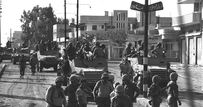
The Islamic Resistance Movement, Hamas, on Tuesday affirmed that the resistance against the Israeli occupation will continue in all its forms and said that the Palestinian people have the right to develop their resistance mechanisms.
In a statement on the 51st anniversary of the Palestinian Naksa (setback), the Islamic Resistance Movement stressed that Jerusalem is the capital of Palestine and that no concession involving the holy city will be ever made.
The Movement said that the US recognition of Jerusalem as Israel's capital and all the attempts made to Judaize the city and alter its identity are null and never accepted.
The statement called on the Palestinian people to commemorate the anniversary of the 1967 setback with the largest participation in the Great Return March protests set to take place on Friday 8th June.
Hamas expressed its rejection of all projects aimed at liquidating the issue of Palestinian refugees, including the attempts to settle them outside Palestine and alternative home projects.
It also warned of the conspiracies targeting the UNRWA as a prelude to dropping the Palestinian refugees' right of return and preventing any compensation for the losses caused by their displacement from their lands.
Hamas saluted the steadfast Palestinian people in Jerusalem, the Gaza Strip, the West Bank, the 1948 occupied territories, and the Diaspora, who, through their sacrifices, affirm every day that they are a people deserving of freedom and independence.
In another context, Hamas stressed the need for building the Palestinian national institutions on the basis of democracy, pluralism, national partnership, and dialogue in order to achieve the national goals and aspirations of the Palestinian people.
The Palestinian Movement called on Fatah to abide by all that was agreed upon in 2005 and 2011, lift the sanctions imposed on the Gaza Strip, and hold a National Council that includes all Palestinian factions in accordance with the outcomes of the 2017 Beirut meeting.
"We strongly reject all forms of normalization with the Israeli occupation from any side and at any level, and we consider it an attack on the Palestinian people and their hopes for freedom and independence," Hamas said.
The movement hailed the countries and international organizations and movements supporting the Palestinian cause and fighting against normalization around the world.
"We adopt a policy of openness to various countries in the world, especially Arab and Muslim nations," Hamas said, adding that it seeks to build balanced relations with other countries while taking into account the requirements of the Palestinian cause and the interests of the Palestinian people.
In a statement on the 51st anniversary of the Palestinian Naksa (setback), the Islamic Resistance Movement stressed that Jerusalem is the capital of Palestine and that no concession involving the holy city will be ever made.
The Movement said that the US recognition of Jerusalem as Israel's capital and all the attempts made to Judaize the city and alter its identity are null and never accepted.
The statement called on the Palestinian people to commemorate the anniversary of the 1967 setback with the largest participation in the Great Return March protests set to take place on Friday 8th June.
Hamas expressed its rejection of all projects aimed at liquidating the issue of Palestinian refugees, including the attempts to settle them outside Palestine and alternative home projects.
It also warned of the conspiracies targeting the UNRWA as a prelude to dropping the Palestinian refugees' right of return and preventing any compensation for the losses caused by their displacement from their lands.
Hamas saluted the steadfast Palestinian people in Jerusalem, the Gaza Strip, the West Bank, the 1948 occupied territories, and the Diaspora, who, through their sacrifices, affirm every day that they are a people deserving of freedom and independence.
In another context, Hamas stressed the need for building the Palestinian national institutions on the basis of democracy, pluralism, national partnership, and dialogue in order to achieve the national goals and aspirations of the Palestinian people.
The Palestinian Movement called on Fatah to abide by all that was agreed upon in 2005 and 2011, lift the sanctions imposed on the Gaza Strip, and hold a National Council that includes all Palestinian factions in accordance with the outcomes of the 2017 Beirut meeting.
"We strongly reject all forms of normalization with the Israeli occupation from any side and at any level, and we consider it an attack on the Palestinian people and their hopes for freedom and independence," Hamas said.
The movement hailed the countries and international organizations and movements supporting the Palestinian cause and fighting against normalization around the world.
"We adopt a policy of openness to various countries in the world, especially Arab and Muslim nations," Hamas said, adding that it seeks to build balanced relations with other countries while taking into account the requirements of the Palestinian cause and the interests of the Palestinian people.
30 may 2017

Events of the Carnival of Freedom were launched on Tuesday morning in Nablus city in the northern West Bank.
The carnival was organized by Nablus governorate in cooperation with governmental institutions in order to mark the 50th anniversary of the Naksa, in which the remaining land of historical Palestine along with the Egyptian Sinai Peninsula and the Syrian Golan Heights were occupied by Israel.
The organizers said that the events aimed at urging Palestinians, Arabs and Muslims to take action in order to regain the Palestinian right in their land and to send a message to Israeli occupation authorities that resistance will continue until the liberation of Palestine.
Scores of Palestinian school students participated in a human chain from the east of the city to al-Shuhada Square in Nablus downtown.
The participants also hoisted the Palestinian flag while sirens were blown for a minute.
The carnival was organized by Nablus governorate in cooperation with governmental institutions in order to mark the 50th anniversary of the Naksa, in which the remaining land of historical Palestine along with the Egyptian Sinai Peninsula and the Syrian Golan Heights were occupied by Israel.
The organizers said that the events aimed at urging Palestinians, Arabs and Muslims to take action in order to regain the Palestinian right in their land and to send a message to Israeli occupation authorities that resistance will continue until the liberation of Palestine.
Scores of Palestinian school students participated in a human chain from the east of the city to al-Shuhada Square in Nablus downtown.
The participants also hoisted the Palestinian flag while sirens were blown for a minute.
